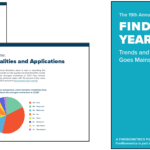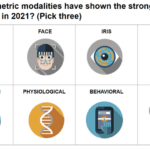Welcome to ID Tech’s digest of identity industry news. Here’s what you need to know about the world of digital identity and biometrics today:
AuthenticID and Credivera Partner to Enhance Workforce Verification with Advanced Biometric Solutions

AuthenticID has partnered with Credivera to deliver a workforce verification and compliance solution integrating biometric authentication and credential verification. AuthenticID’s technology, capable of verifying over 8,500 ID types across 240 countries and territories, will enhance Credivera’s application by enabling near-instant identity proofing and re-authentication. The combined solution supports processes like background checks, education and credential validation, license certification verification, and drug screening. Credivera’s clients will benefit from added verification layers that streamline workflows and strengthen workforce credential assurance.
ID.me Appoints Christine Purcell as Chief Marketing Officer to Propel Growth
ID.me has appointed Christine Purcell as its Chief Marketing Officer to support the company’s expansion and growth. Purcell brings extensive experience from roles at BeMe Health, Twin Health, and Facebook, where she led marketing for Messenger and implemented biometric security features like App Lock. Her background includes strategy consulting at McKinsey & Company and a track record of driving growth in health tech companies. ID.me, valued at $1.8 billion, has grown to over 135 million users, with more than 63 million verified to IAL2 consumer authentication standards. The company’s digital wallet simplifies online identity verification while adhering to NIST 800-63-3 IAL2 / AAL2 standards. CEO Blake Hall highlighted Purcell’s expertise in marketing consumer and commercial products as key to ID.me’s mission to enhance secure digital identity verification and prevent fraud.
French Telecom Operators Launch Unified APIs to Combat Online Fraud
French telecom operators Bouygues Telecom, Free, Orange, and SFR have launched unified APIs to enhance digital identity protection and combat online fraud under the GSMA Open Gateway initiative. The KYC Match API cross-references customer-provided information with mobile network records to strengthen identity verification in Know Your Customer (KYC) processes. The SIM Swap API prevents unauthorized SIM card changes, addressing risks from fraud schemes aimed at intercepting authentication codes. These APIs, built to the CAMARA standard, have been tested with financial institutions like BforBank and Fortuneo and are used by over 20 companies in France for fraud prevention and customer identity verification. The operators plan to introduce a Number Verification API in 2025 for verifying mobile numbers. Part of a global initiative involving 67 mobile network groups, this collaboration aims to standardize API deployment across networks, addressing growing threats to digital security worldwide.
Axiad Launches Axiad Mesh to Tackle Enterprise Identity Risks
Axiad has launched Axiad Mesh, a solution designed to address enterprise-scale identity risks by providing visibility and management of identity vulnerabilities. The system connects SaaS and on-premises solutions, employing machine learning-powered identity correlation to unify identity data from siloed systems. It assigns risk scores to highlight inconsistencies and vulnerabilities, quantifies the attack surface, and predicts future risks based on trends. Axiad Mesh improves identity hygiene by detecting issues such as weak multi-factor authentication and excessive permissions, leveraging automated workflows to remediate risks. Integrated with Axiad Conductor, a FedRAMP-compliant phishing-resistant authentication platform, the solution ensures strong security for public sector requirements. It supports out-of-the-box connectors with third-party tools like Microsoft Entra ID and CrowdStrike.
FBI Seeks Advanced Biometric Algorithms to Enhance Next Generation Identification System
The Federal Bureau of Investigation (FBI) has issued a Request for Information (RFI) seeking advanced biometric matching algorithms to enhance its Next Generation Identification (NGI) system. Managed by the Criminal Justice Information Services (CJIS) Division, the NGI system is one of the largest biometric databases in the world, supporting U.S. law enforcement. The RFI focuses on algorithms for tenprint and latent fingerprint processing, facial recognition, and iris biometrics, aiming to identify technologies with superior accuracy and performance. Vendors must submit their algorithms to the National Institute of Standards and Technology (NIST) for evaluation by January 31, 2025, with results guiding the FBI’s strategic decisions on NGI system upgrades. Submissions require detailed company information and an executive summary.
Racial Bias, Trans Targeting, and Murder: Nashville Rejects FRT Amid Culture War Tempest
Nashville’s Metro Council has rejected the Fusus police surveillance technology following months of debate and opposition from community groups. The technology, which integrates video feeds from public and private cameras for law enforcement, faced criticism over privacy concerns, potential racial profiling, and the misuse of surveillance tools. Community organizations, including the Nashville NAACP, voiced strong opposition, citing fears of excessive government surveillance and discrimination against marginalized groups, particularly the transgender community. Despite an amended proposal banning facial recognition and allowing contract termination in case of misuse, the legislation failed to pass, with only 20 of the 21 votes required for approval. Supporters, including Mayor Freddie O’Connell, argued that Fusus could enhance public safety and policing efficiency. Opponents maintained that its risks outweighed potential benefits, aligning with broader concerns about surveillance technology’s impact on civil liberties.
Ghana Commissions Advanced e-Gate System for Border Control
Ghana has commissioned an e-gate system at Kotoka International Airport (KIA) to enhance passenger clearance, streamline immigration processes, and improve border security. The system integrates biometrics, artificial intelligence, and real-time data processing to enable efficient and secure verification. It will use the Ghana Card’s biometric features to reduce reliance on traditional checks and supports online and offline operations for uninterrupted processing. Travelers can expect reduced waiting times, with clearance completed in as little as 15 minutes. The e-gates will cross-reference biometric data with national and international databases to prevent fraud and unauthorized entry while facilitating tracking of individuals of security concern.
MetaOptics to Showcase Contactless 3D Biometric Sensor Using Metalens Technology at CES 2025
MetaOptics Technologies, a Singapore-based metalens manufacturer, plans to unveil a contactless 3D biometric sensor at the Consumer Electronics Show, leveraging metalens technology for high-precision fingerprint recognition without physical contact. The sensor aligns with the growing adoption of contactless biometric solutions, driven by increased hygiene concerns during the pandemic. MetaOptics specializes in nanoscale metalens production, offering advantages like ultra-thin form factors and precise light manipulation for imaging and sensing applications. The company achieved a breakthrough in 2023 by directly processing metasurfaces on 300mm glass wafers, enabling scalable manufacturing. Collaborating with Singapore’s A*STAR, MetaOptics also developed a Direct Laser Writer for precise prototyping.
–
December 5, 2024 – by Tony Bitzionis and Alex Perala








Follow Us